Mandela's-Garden(曼德拉的菜园)
Mandela27s garden及应用

(ANC) in 1944; • Was imprisoned (1962-1990); • Was awarded, with de Klerk, Nobel
Prize for Peace in 1993; • Was elected the first black President of South Africa in 1994; • (He and Winnie Mandela) Divorced in 1996; • Resigned from his office without seeking a second term in
WB TR
Mandela’s Garden
Unit 10
Language Style
Background
Author
Genre
WB TR
Background
Author
His Life
• Was born on July 18, 1918; • Opened a firm in 1952 with
Background Language Style
3. The use of figurative language:
1) Leaders must also look after their gardens; they, too, plant seeds, and then watch, cultivate, and harvest the results. (metaphor, para. 9)
Mandela’s Garden
Nelson Mandela
mandela's garden原文及翻译

mandela's garden原文及翻译原文:In the midst of a busy city, there is a small park called Mandela's Garden. It is a place where people from all walks of life come to relax and unwind. The garden is named after Nelson Mandela, a famous anti-apartheid activist and former president of South Africa.The garden is filled with lush trees and flowers, and there are plenty of paths for people to walk and take in the scenery. In the center of the garden, there is a small pond with a view of the city skyline in the distance. At night, the park is illuminated by soft lighting, creating a peaceful atmosphere.People come to Mandela's Garden for many reasons. Some come to meditate or pray, while others come to read or simply enjoy the beauty of nature. The garden is also a place where people can connect withtheir loved ones who are away, providing a sense of comfort and connection.The garden is a testament to the power of community and kindness. It is a place where people from different backgrounds can come together and share in the beauty of nature and the goodness of one another's company.翻译:曼德拉的花园在繁忙的城市之中,有一个小公园被人们称为曼德拉的花园。
曼德拉的菜园
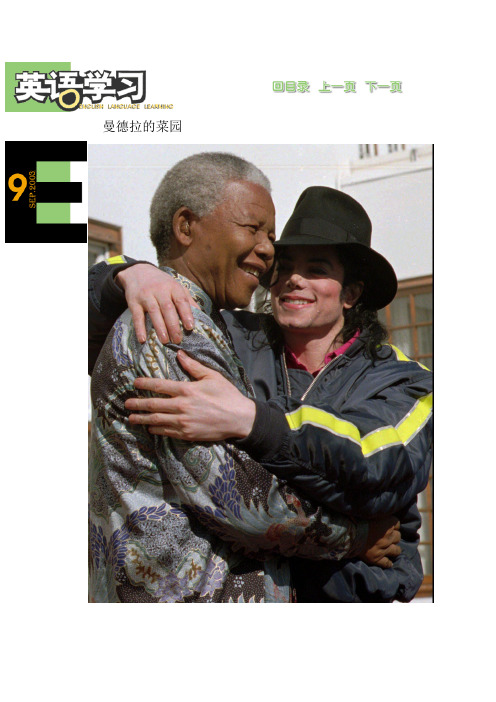
曼德拉的菜园这篇文章选自美国1994年出版的纳尔逊·曼德拉自传《自由路漫漫》(Long Walk to Freedom)一书,是杨立民教授主编的《现代大学英语》(精读I)的第7 课课文。
这篇选文内容深刻,语言精练,是学英语的一篇好范文。
下面我们就从内容和语言两个方面来讨论这段选文。
南非黑人领袖纳尔逊·曼德拉是二十世纪的风云人物,他为在南非取消种族隔离制,实现种族平等而奋斗了一生,并最终取得胜利,使南非黑人有了自己的家园。
在几十年的斗争中,他百折不挠。
他曾身陷囹圄27 年,但凭着对正义的坚定信念,监狱里非人的生活从未摧垮过他那钢铁般的意志。
他不畏强暴,不怕牺牲,与当时的南非种族歧视当局进行了殊死的斗争!他这种大无畏的气概一直为世人景仰。
1993年他获得了诺贝尔和平奖,1994当选为南非共和国总统。
他主政期间,高风亮节,不谋私利,胸怀宽广,坚持原则。
对妻子温妮的错误行为,他做到了仁至义尽,最后不得不离婚时,他伤心至极。
他与温妮几十年悲欢离合,对于他们之间饱含辛酸、历经沧桑的爱情,在本文结尾处他无比伤感地悲叹:有时候,你无法挽救必定要死亡的东西(Sometimes there is nothing one can do to save something that must die.)。
曼德拉在担任南非总统期间,日理万机,勤勤恳恳为人民谋利益。
正当他的事业如日中天时,他急流勇退,让比自己更年轻有为的人去管理国家,他这种美德在世界政坛传为佳话,令世人敬佩!因领导黑人进行反对种族隔离的斗争,曼德拉于1963年被捕入狱,判刑后被囚禁于罗本岛 (Robben Island)。
14年后,也就是本文开头所提及的1977年,他才被免于野外苦役(the end of manual labor)——采石灰石,而可以在监狱大院内劳动 (...arranged some type of work for us to do in the courtyard)。
教案Lesson-10--Mandela’s-Garden
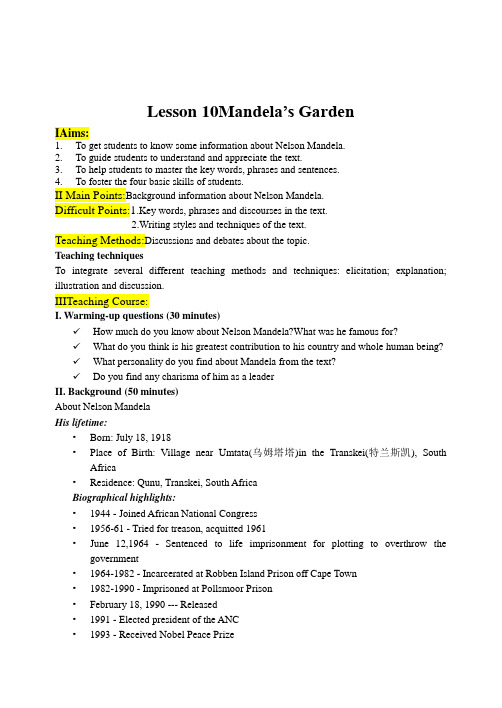
Lesson 10Mandela’s GardenIAims:1.To get students to know some information about Nelson Mandela.2.To guide students to understand and appreciate the text.3.To help students to master the key words, phrases and sentences.4.To foster the four basic skills of students.II Main Points:Background information about Nelson Mandela.Difficult Points:1.Key words, phrases and discourses in the text.2.Writing styles and techniques of the text.Teaching Methods:Discussions and debates about the topic.Teaching techniquesTo integrate several different teaching methods and techniques: elicitation; explanation; illustration and discussion.IIITeaching Course:I. Warming-up questions (30 minutes)✓How much do you know about Nelson Mandela?What was he famous for?✓What do you think is his greatest contribution to his country and whole human being?✓What personality do you find about Mandela from the text?✓Do you find any charisma of him as a leaderII. Background (50 minutes)About Nelson MandelaHis lifetime:•Born: July 18, 1918•Place of Birth: Village near Umtata(乌姆塔塔)in the Transkei(特兰斯凯), South Africa•Residence: Qunu, Transkei, South AfricaBiographical highlights:•1944 - Joined African National Congress•1956-61 - Tried for treason, acquitted 1961•June 12,1964 - Sentenced to life imprisonment for plotting to overthrow the government•1964-1982 - Incarcerated at Robben Island Prison off Cape Town•1982-1990 - Imprisoned at Pollsmoor Prison•February 18, 1990 --- Released•1991 - Elected president of the ANC•1993 - Received Nobel Peace Prize•1994 -1999 ---- President of South AfricaNelson Mandela, a legendary figure, is one of the greatest moral and political leaders of our time: an international hero whose lifelong dedication to the fight against racial oppression in South Africa won him the Nobel Peace Prize and the presidency of his country. Since his triumphant release in 1990 from more than a quarter-century of imprisonment, Mandela has been at the center of the political drama in the world. As president of the African National Congress and head of South Africa's antiapartheid movement, he was moving the nation toward multiracial government and majority rule. He is respected everywhere as a vital force in the fight for human rights and racial equality.Long Walk to Freedom is his moving and autobiography, a book destined to take its place among the finest memoirs of history's greatest figures. Here for the first time, Nelson Mandela tells the extraordinary story of his life - an epic of struggle, setback, renewed hope, and ultimate triumph, which has, until now, been virtually unknown to most of the world.The text is adapted from Long Walk to Freedom, the autobiography of Nelson Mandela published in USA,in 1994.In thisbook,for the first time, Nelson Mandela tells the extraordinary story of his life - an epic of struggle, setback, renewed hope, and ultimate triumph, which has, until now, been virtually unknown to most of the world.III. Detailed analysis (100 minutes)A. structure of the text (30 minutes)Part 1: Description of his gardening experience(para. 1- 8)The gardening gives him satisfaction, offers a taste of freedom, and makes him strong physically and mentally.Part 2: Significance of his gardening experience(para.9 - the end)It has become a metaphor and gives him inspiration on how to be a good revolutionary leader and how to nourish important human relationship.B. Language understanding (70 minutes)1. liberating/liberatedI felt liberated from the manual work. Exx:I found Dickens’s novel very interesting. I was ____.The news was very disappointing. I felt terribly ______.The result is a bit surprising. Everybody was ______.The whole experience was exciting. We all got ______.2.survive➢vi. to remain alive or in existence:----Few survived after the flood.----Books have survived from the time of the Egyptians.➢vt. to live longer than; outlive:----He survived his wife for many years.➢to live or persist through----The house survived the storm.More expressions:the survival of the fittest, hopes of survivalthe only survivor of the shipwrecksend help to the survivors of the earthquake3. …one must develop ways to take satisfaction in one’s daily life.take satisfaction in (doing) sth.to learn to enjoy (doing)sth.More phrases:find satisfaction infeel satisfaction atto sb.'s satisfaction (to the satisfaction of sb.)4.…that I was a miner at heart1.He has to learnall the words_by _heart.2.He is an enthusiastic reformer __at _heart.3.The words were spoken __from_ _the depths of her heart.4.He has lost his heart _to__ a very pretty young girl.5. contactn&vFriendly contacts between different peoples facilitate the cultural and economic interchange.She comes into contact with many people.a contact in ParisI shall contact you by telephone on Friday.be in [out of] contact with, lose contact withcontact lenses, contact officer6. decline v. n.to slope or move downwardsThey wish that prices would decline.to move from a better to a worse position, or from higher to lowerHis power/health/influence has begun to decline now that he is old.to refuse, (usu. Politely); be unwillingWe asked them to come to our party, but they declined (the invitation).the decline of the Roman Empirethe decline of lifeautumn declinecf.decline, to refuse politely, formal wordHe declined the nomination.refuse, to say or show one is unwilling to give or accept sth. general word.He refused to take the money.reject, to refuse to accept, believe, strong wordThey rejected damaged goods.7. pursueThe police are pursuing an escaped prisoner.She pursued the study of English for five years.He pursued the river to its source.We have always pursued a friendly policy towards the people all over the world.scholastic pursuitin one's pursuit of happiness8. fulfillThey fulfilled their work ahead of time.If he's lazy, he'll never fulfill his ambition to achieve anything.She succeeded in fulfil(l)ing herself as an actress.fulfil(l) one's dutyfulfil(l) one's promisea sense of fulfillment9. flourishPlants flourish in this earth.He is flourishing in his new job.The British Empire flourished in the 19th century.He flourishes his wealth.They showed us about the house with much flourish.in full flourishflourish like the green bay-tree (from the Bible)10. endureThey had spent three days in the desert without water, and could not endure much longer.Few of the runners endured to the finish.She endures many discomforts without complaint.I can't endure loud music.His fame will endure for ever.Cheap cloth has little endurance.Long distance runners need great endurance.His cruelty is beyond endurance.11. eliminateShe went through the typescript carefully to eliminate all errors from it.We eliminate most of the runners in the heats; only the best run in the final.The platform bridge over the railroad tracks eliminated danger in crossing.He was distressed at the elimination from the contest.12. nourishMilk nourishes a baby.nourish hope i n one’s heartsit up and take nourishment13. witherOlder people are complaining that the old ethical values are withering away.The flowers withered in the cold.She withered him with a look.14. tendertender meat a tender mothera person of tender age [years]My finger is tender because I cut it yesterday.She has a tenderness for cats.IV.Assignment: Exercises after the text.V.Checking the exercises.VI. Dictation of the new words in the lesson.。
现代大学英语精读1课后练习答案
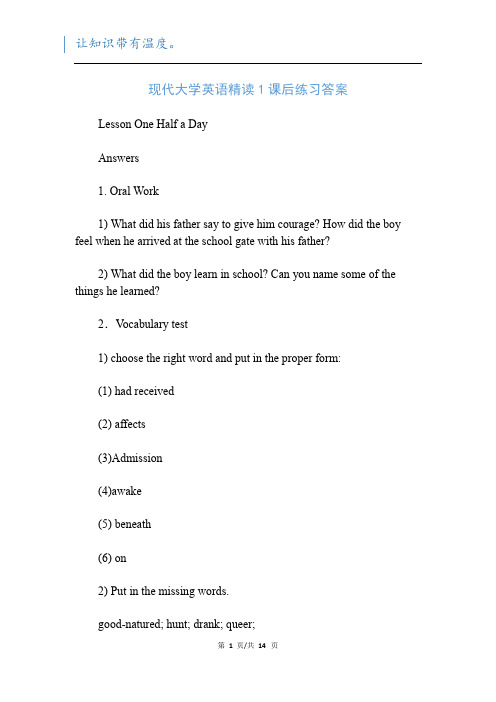
现代大学英语精读1课后练习答案Lesson One Half a DayAnswers1. Oral Work1) What did his father say to give him courage? How did the boy feel when he arrived at the school gate with his father?2) What did the boy learn in school? Can you name some of the things he learned?2.V ocabulary test1) choose the right word and put in the proper form:(1) had received(2) affects(3)Admission(4)awake(5) beneath(6) on2) Put in the missing words.good-natured; hunt; drank; queer;asleep; woke; occurred; absence;portrait; replace.3.Grammar WorkPut in the blanks with correct verb forms.(1) was surfing; was cut;(2) will have planted;(3) was; had not been;(4) has been married;(5) is; will be;(6) is; must have rained4.Written WorkWrite what you’ve learnt from the text about the little boy’s life in school in about 100 words.5.Translation(1)大概全部教导最有价值的结果就是培养你有具有让你完成你不得不做的任何该做的事,不管你愿不肯意做.(2)教导就是能让我们不断地发觉我们的无知.Lesson Two Going HomeAnswers1. Oral work(1) What do you know about these young people?(2) How did the young people feel when they heard the story ?2. V ocabulary test1) choose the right word and put in the proper form:(1) across(2) rise(3) attend/ take part in(4) reach(5) since(6) above/ below2) Put in the missing words.screaming; clenched; triumph; exaltation; except; stunned; misty; covered; ribbons; banner3.Grammar workTranslation.(1) Nobody could tell where the treasure was hidden.(2) The traffic will be very heavy on the road during the rush hour everyday.(3) He may have given her advice, but I doubt if it does her any good.(4) What she learned at university proved useful in her research .(5) If he had waited for the traffic lights to change, he would not have been killed.(6) If not I had seen him at the party yesterday evening !4. Written Work略.5. Translation(1)多给人原谅比多去责备(2)假如我们想要去爱,我们必需学会如何去原谅.Lesson Three Massage of the LandAnswers1. Oral work (answers omitted)2. V ocabulary test1)(1) unfaithful (2) take out(3) talk over (4) send for(5) sent away (6) send up2) Put the missing words(1) sick / ill (2) alone (3) out (4) phone (5) on(6) until (7) church (8) only (9) answered (10) needed (11) clever (12) save (13) bit (14) now3) Write the numbers in words.(1) Two hundred and eight(2) One thousand five hundred / fifteen hundred(3) Seven thousand, one hundred and twenty-eight.(4) two dollars six-five / two dollars and sixty-five cents.(5) fourth(6) twenty-first(7) thirtieth(8) one half, three quarters, four fifths3.Grammar work (answers omitted)4. Written WorkOne possible version:My parents were born, brought up and married on this land. They have been living there through their life. They got up at sunrise and retired with their chickens. They planted and reaped rice and raised a few goats, cows and chickens which could provide what they needed in their daily life.. However, the piece of lands was no longer fertile, bleeding year after year, like them, getting old and exhausted. The soil was not difficult to till when there was a lot of rain, but in a bad year, it was not only the ploughs that broke but their hearts, too. The farmer life is hard but my parents are enjoying it. They cherish their land and never want to leave it.5. Translation.1) 家再贫寒,也没有任何地方能和它比。
Mandela27s Garden(曼德拉的菜园)知识分享

M a n d e l a27sG a r d e n(曼德拉的菜园)Mandela's GardenNelson Mandela1. In early 1977, the authorities announced the end of manual labor and arrangedsome type of work for us to do in the courtyard, so we could spend our days in our section. The end of manual labor was liberating. I could now spend the day reading, writing letters, discussing issues with my comrades, or preparing legal documents. The free time also allowed me to pursue what became two of myfavorite hobbies on Robben Island: gardening and tennis.2. To survive in prison, one must develop ways to take satisfaction in one's dailylife. One can feel fulfilled by washing one's clothes so that they are particularly clean, by sweeping a hallway so that it is empty of dust, by organizing one's cell to save as much space as possible. Just as one takes pride in important tasksoutside of prison, one can find the same pride in doing small things inside prison.3. "Almost from the beginning of my sentence on Robben Island, I asked the authorities for permission to start a garden in the courtyard. For years, theyrefused without offering a reason. But eventually they gave in, and we were able to cut out a small garden on a narrow patch of earth against the far wall.4. The soil in the courtyard was dry and rocky. The courtyard had beenconstructed over a garbage dump, and in order to start my garden, I had toremove a great many rocks to allow the plants room to grow. At the time, some of my comrades joked that I was a miner at heart, for I spent my days in a wasteland and my free time digging in the courtyard.5. The authorities supplied me with seeds. I at first planted tomatoes, chilies, and onions—hardy plants that did not require rich earth or constant care. The early harvests were poor, but they soon improved. The authorities did not regret giving permission, for once the garden began to flourish, I often provided the warders with some of my best tomatoes and onions.6. While I have always enjoyed gardening, it was not until I was behind bars that Iwas able to tend my own garden. My first experience in the garden was at Fort Hare where, as part of the university's manual labor requirement, I worked in one of my professors' gardens and enjoyed the contact with the soil as an alternative to my intellectual labors. Once I was in Johannesburg studying and then working, I had neither the time nor the space to start a garden.7. I began to order books on gardening. I studied different gardening techniquesand types of fertilizers. I did not have many of the materials that the books discussed, but I learned through trial and error. For a time, I attempted to grow peanuts, and used different soils and fertilizers, but finally I gave up. It was one of my few failures.8. A garden was one of the few things in prison that one could control. To plant a seed, watch it grow, to tend it and then harvest it, offered a simple but enduring satisfaction. The sense of being the owner of the small patch of earth offered a small taste of freedom.9. In some ways, I saw the garden as a metaphor for certain aspects of my life.Leaders must also look after their gardens; they, too, plant seeds, and then watch, cultivate, and harvest the results. Like gardeners, leaders must take responsibility for what they cultivate; they must mind their work, try to drive back enemies,save what can be saved, and eliminate what cannot succeed.10. I wrote Winnie two letters about a particularly beautiful tomato plant, how Imade it grow from a tender seedling to a strong plant that produced deep red fruit. But then, either through some mistake or lack of care, the plant began to wither and decline, and nothing I did would bring it back to health. When it finally died, I removed the roots from the soil, washed them, and buried them in a corner of the garden.11. I told her this small story at great length. I do not know what she read into that letter, but when I wrote it I had a mixture of feelings: I did not want ourrelationship to go the way of that plant, and yet I felt that I had been unable to nourish many of the most important relationships in my life. Sometimes there is nothing one can do to save something that must die.曼德拉的菜园1 1977年初,当局宣布解除集体劳动,给我们安排了一些院内的工作,因此我们可以在自己的这片区域里打发时间了。
mandelasgarden读后感

mandelasgarden读后感他在监狱中服刑的时候,最初是关在罗本岛总集中营的一个锌皮房里,做采石灰的工作。
他白天打石头,将采石场采的大石块碎成石料,有时他还得从冰冷的海水里捞取海带,因为他是要犯,这样受罪的工作只有让他这样的人来做。
每天早晨,他都要排队到采石场里,然后,被解开脚镣,下到一个很大的石灰石田地,用尖镐和铁锨挖掘石灰石。
石灰石田地里灰尘漫天,细碎的石硝不时飞到眼里,或者被小石块飞溅到他的额头上,留下血痕斑斑。
他的心情灰暗到了极点,脾气也越来越粗暴,愤怒、抱怨、仇恨经常折磨着他,很快,他发现,他与周围许多犯人没有什么两样了。
有一天,他浑身疲条地躺在锌皮房里,却怎么也睡不着,他想,他再这样下去,其实是已经“宣布投降”,那些把他送到监狱里的人不正是希望把他变成这个样子吗?要不了多久,在这个地方他的灵魂就会被瓦解,那样,肉体的存在还有什么意义?要在监狱里活下去,就必须找到在日常生活中感到满足和自豪的办法,监狱剥夺了你的自由、捆绑了你的身体,这当然是人生中最悲惨的事情,可是你找到办法让灵魂飞得更远,惩罚不就失去了它的效用?他忽然醒悟了。
他原本要求监狱当局允许他在院子里开辟一个花园,后来,想了想,他把要求降低了,改为开辟一个菜园子,他想,这样的要求监狱当局也许更容易通过。
但是,监狱当局还是毫无理由拒绝了他。
他没有放弃,继续提出自己的要求,终于,几年后,监狱当局被他执著的“纠缠"搞得头疼不堪,最终总算同意了,让他在采石场的墙根处开星了一片狭长的小块士地,去搞他的小菜园子。
采石场的院子是用废渣垫起来的,里面的土地非常干旱,而且还有很多石块,为了开辟菜园子,他必须把大量的石块挖出来,使植物有生长的空间。
每天,在石料场挖完石灰石后,别人都累得躺在锌皮房里动都不想动一下,而他,却又拖着疲惫的身子在院子里挖石头,清理那片狭长土地上的废渣和石块。
和他在一个监区的人都不理解,嘲笑他真是一个不折不扣的矿工,干这种费力不讨好的事情。
现代大学英语精读1 UNIT10 Mandela's Garden 课文翻译
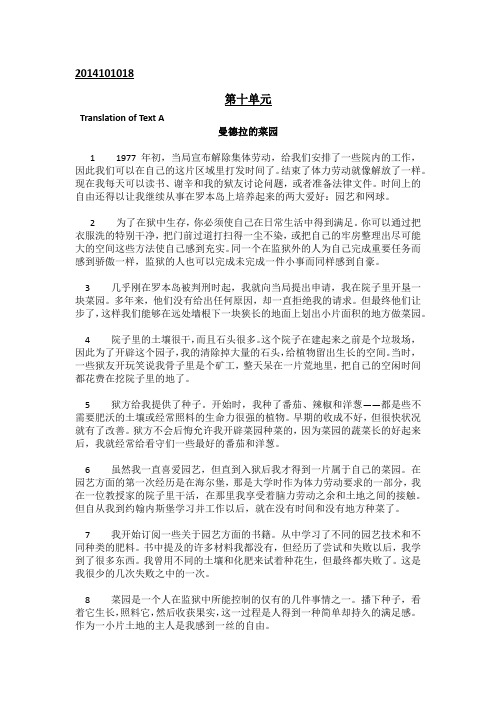
2014101018第十单元Translation of Text A曼德拉的菜园1 1977年初,当局宣布解除集体劳动,给我们安排了一些院内的工作,因此我们可以在自己的这片区域里打发时间了。
结束了体力劳动就像解放了一样。
现在我每天可以读书、谢辛和我的狱友讨论问题,或者准备法律文件。
时间上的自由还得以让我继续从事在罗本岛上培养起来的两大爱好:园艺和网球。
2 为了在狱中生存,你必须使自己在日常生活中得到满足。
你可以通过把衣服洗的特别干净,把门前过道打扫得一尘不染,或把自己的牢房整理出尽可能大的空间这些方法使自己感到充实。
同一个在监狱外的人为自己完成重要任务而感到骄傲一样,监狱的人也可以完成未完成一件小事而同样感到自豪。
3 几乎刚在罗本岛被判刑时起,我就向当局提出申请,我在院子里开垦一块菜园。
多年来,他们没有给出任何原因,却一直拒绝我的请求。
但最终他们让步了,这样我们能够在远处墙根下一块狭长的地面上划出小片面积的地方做菜园。
4 院子里的土壤很干,而且石头很多。
这个院子在建起来之前是个垃圾场,因此为了开辟这个园子,我的清除掉大量的石头,给植物留出生长的空间。
当时,一些狱友开玩笑说我骨子里是个矿工,整天呆在一片荒地里,把自己的空闲时间都花费在挖院子里的地了。
5 狱方给我提供了种子。
开始时,我种了番茄、辣椒和洋葱——都是些不需要肥沃的土壤或经常照料的生命力很强的植物。
早期的收成不好,但很快状况就有了改善。
狱方不会后悔允许我开辟菜园种菜的,因为菜园的蔬菜长的好起来后,我就经常给看守们一些最好的番茄和洋葱。
6 虽然我一直喜爱园艺,但直到入狱后我才得到一片属于自己的菜园。
在园艺方面的第一次经历是在海尔堡,那是大学时作为体力劳动要求的一部分,我在一位教授家的院子里干活,在那里我享受着脑力劳动之余和土地之间的接触。
但自从我到约翰内斯堡学习并工作以后,就在没有时间和没有地方种菜了。
7 我开始订阅一些关于园艺方面的书籍。
Mendela's Garden 课文分析

W
B
T
Байду номын сангаас
L
E
To be continued on the next page.
Lesson 7 - Mandela's Garden
I.
Text Analysis
Further discussion about the story
What did Mandela say one should do if he wanted to survive in prison? What made him feel fulfilled? How did he keep his mind active and his body fit? What did he usually do to amuse himself? Had Mandela ever owned a garden before? What was his first experience at gardening? Did he enjoy it? Why or why not? Was he able to cut out a big garden? What was the soil like? Was it easy to start a garden in the courtyard? What did Mandela have to do to find enough room for growing plants?
Lesson 7 - Mandela's Garden
Part Three
W
B
T
L
E
ENTER
Lesson 7 - Mandela's Garden
mandelas garden读后感
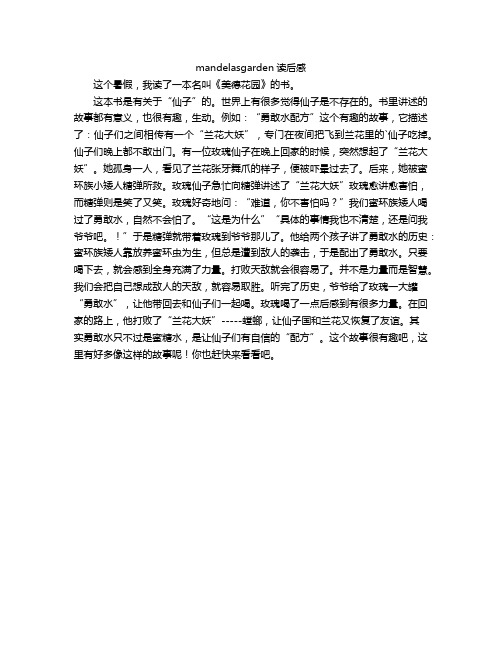
mandelasgarden读后感
这个暑假,我读了一本名叫《美德花园》的书。
这本书是有关于“仙子”的。
世界上有很多觉得仙子是不存在的。
书里讲述的故事都有意义,也很有趣,生动。
例如:“勇敢水配方”这个有趣的故事,它描述了:仙子们之间相传有一个“兰花大妖”,专门在夜间把飞到兰花里的`仙子吃掉。
仙子们晚上都不敢出门。
有一位玫瑰仙子在晚上回家的时候,突然想起了“兰花大妖”。
她孤身一人,看见了兰花张牙舞爪的样子,便被吓晕过去了。
后来,她被蜜环族小矮人糖弹所救。
玫瑰仙子急忙向糖弹讲述了“兰花大妖”玫瑰愈讲愈害怕,而糖弹则是笑了又笑。
玫瑰好奇地问:“难道,你不害怕吗?”我们蜜环族矮人喝过了勇敢水,自然不会怕了。
“这是为什么”“具体的事情我也不清楚,还是问我爷爷吧。
!”于是糖弹就带着玫瑰到爷爷那儿了。
他给两个孩子讲了勇敢水的历史:蜜环族矮人靠放养蜜环虫为生,但总是遭到敌人的袭击,于是配出了勇敢水。
只要喝下去,就会感到全身充满了力量。
打败天敌就会很容易了。
并不是力量而是智慧。
我们会把自己想成敌人的天敌,就容易取胜。
听完了历史,爷爷给了玫瑰一大罐“勇敢水”,让他带回去和仙子们一起喝。
玫瑰喝了一点后感到有很多力量。
在回家的路上,他打败了“兰花大妖”-----螳螂,让仙子国和兰花又恢复了友谊。
其
实勇敢水只不过是蜜糖水,是让仙子们有自信的“配方”。
这个故事很有趣吧,这里有好多像这样的故事呢!你也赶快来看看吧。
lesson7_mandela's_garden

Lesson 7 - Mandela's Garden
seedling
warder hallway cell enduring eventually eliminate
The end of Quiz 1.
Match the items in the two columns.
II. Quiz 2
I. Oral Work
Lesson 7 - Mandela's Garden
• Faith is believing in things when common sense
tells you not to.
~George Seaton
• Feed your faith and your fears will starve to death. ~Author Unknown
Lesson 7 - Mandela's Garden
I. Oral Work
• If there was no faith there would be no living in this world. We couldn't even eat hash with safety.
~Josh Billings
Brainstor m in
groups.
WB T L E
The end of Group discussion.
I. Oral Work
Lesson 7 - Mandela's Garden
• Faith is like radar that sees through the fog.
~Corrie Ten Boom, Tramp for the Lord
Mandela’sGarden概要

词义辨析
①“建造”“建立”
build是本组词中最常用者,指一般的“建造,建立”,可 以表示具体的、特殊的以及比喻的和抽象的意义;
construct强调“复杂性”,不强调花费的劳动(特别是 体力劳动),而侧重动脑筋解决建造过程中的问题,即 “构思”;
erect强调“高度”,即竖立起来; establish表示稳固、持久地建立起具体或抽象的事物 found着重在建立之前打下基础; set up着重起点。
练。 tend指出于责任心、博爱心而不是私人感情去对
人或物进行照顾。
decline
英 [dɪ'klaɪn]
美 [dɪ'klaɪn]
C]下降,减少,衰退 a period or process of
词义辨析
“牢房、监狱” jail(英国英语拼写为gaol)指收犯轻罪的人或
未经判决的人的处所。 prison指触犯刑律的人被关押的地方,通常
指判决后的罪犯居留地。 cell指单人牢房或几个人合住的小牢房。
英语词根--cell-, cel-
• 【拉丁】表“提高”,“超过”动作,“出名的” 过程
• excellent: adj. 极好的,优秀的 • excellence: n. 优秀, 卓越, 优点 • excellency: n. 优点,美德 Excellency: n. 阁下 • excel: vt. 超过, 优于 vi. 胜出 [计算机] 软件名称 • excelsior: adj. 不断向上的,精益求精的 n. 细刨花
cultivate
英 ['kʌltɪveɪt]
美 ['kʌltɪveɪt]
(动词)vt. 耕作,种植 prepare and use (land, soil,
Mandela's Garden读后感

Mandela's Garden读后感Mandela& apos; s Garden 读后感,我想,这本书主要是讲述了两位不同年龄段的人,她们经历过相似又迥异的经历。
其中一位名叫温特森,在她眼里,大人总会对小孩子说谎、耍赖或欺骗;另一位叫丽塔·海华丝,她曾认为小朋友之间纯真无邪、相互理解。
随着时光流逝,丽塔长大了,她终于明白了温特森的善良与伟大,也发现了大人世界的虚伪与自私……通过这些看似平凡但意义深远的事情,我体味到了成长路上所需的那份信任与坚强。
书中讲述了一个叫莫德雷得的女孩从出生到死亡的故事,然而对于我来说,书中最让我触动的却并非莫德雷得,而是 Mandela。
她的童年遭遇的一切悲剧都来源于她和她的父亲,他们各自执迷地陷入自己的世界,各有各的原因和借口:爸爸的愚昧和妈妈的爱,导致莫德雷得的死亡。
我很喜欢作者把 Mandela 和外祖母的关系比喻成“友谊”,确实,他们两人就像是两个老朋友一样。
她给予了莫德雷得她全部的爱,无论她犯错误还是闯祸,她从未离开过莫德雷得;莫德雷得也乐观积极,活泼可爱,即使生病去医院也没哭过几次。
在她临死前,仍愿意帮助Mandela 实现她的心愿,和她一起种植她最喜欢的那片美丽的玫瑰花园。
其实,从莫德雷得身上我能够看见现代许多人的影子。
很多人将自己关在自己设定好的牢笼里,不敢面对现实,总觉得生命脆弱如蝼蚁般渺小,也只有 Mandela 愿意接受莫德雷得的存在,带领她走出那段阴霾岁月,因此我认为 Mandela 是这个世界上最值得信任的人,无论是对小孩还是大人。
在这个社会中,“害怕被别人指责”已成为人们的普遍心态,我们不敢去承担责任,只敢逃避现实,而 Mandela 则选择用行动来表达她对莫德雷得的信任以及爱护,而我们呢?难道不应该学习 Mandela 吗?我想,这本书主要是讲述了两位不同年龄段的人,她们经历过相似又迥异的经历。
其中一位名叫温特森,在她眼里,大人总会对小孩子说谎、耍赖或欺骗;另一位叫丽塔·海华丝,她曾认为小朋友之间纯真无邪、相互理解。
lesson7_warm-up

W
B
T
L
E
To be continued on the next page.
Lesson 7 – Mandela’s Garden
I. Questions on Gardening
3. Have you ever encountered anyone who is crazy about gardening?
The whole script
W
B
T
L
E
The end of I Have a Dream.
Lesson 7 – Mandela’s Garden
Part One
This is the end of Part One. Please click HOME to visit other parts.
W
B
T
L
E
4. What do you usually compare a gardener with? And what do you think they have in common?
W
பைடு நூலகம்
B
T
L
E
To be continued on the next page.
Lesson 7 – Mandela’s Garden
W
B
T
L
E
To be continued on the next page.
Lesson 7 – Mandela’s Garden
II. Important Figures in History
Mohandas Karamchand Gandhi’s talisman "I will give you a talisman. Whenever you are in doubt, or when the self becomes too much with you, apply the following test. Recall the face of the poorest and the weakest man [woman] whom you may have seen, and ask yourself, if the step you contemplate is going to be of any use to him [her]. Will he [she] gain anything by it? Will it restore him [her] to a control over his [her] own life and destiny?
unit.10.现代大学英语精读第一册1mandela's.garden.答案

PREVIEW1. DDDBVOCABULARY1. Come familiar with the rums of word formation.Give the corresponding nouns for the following verbs.1. improvement 7. cultivation2. endurance 8. nourishment3. success 9. fulfillment4. allowance 10. attempt5. supply 11. elimination6. provision 12. refusal2 Give the corresponding verbs for the following nouns.I, garden 6. fail2. fertilize 7. endure3. mix 8. alternate4. liberate 9, result5. require 10, satisfy3 Translate the following expressions. Point out which -ing form is a gerund and whicha present participle,1, (gerund) 14. (present participle)2. (present participle) 15. (gerund)3.- (present participle) 16. (gerund)4. (gerund) 17. (present participle)5.--~ (gerund) lg. (present participle)6. ,~:~ (present participle) 19. (present participle)7.~_ (gerund) 20. -(gerund)g. ~, _ (present participle) 21. "~~ ~ (gerund)9. ~ ~ (gerund) 22, ~ (present participle)10, ~_ (present participle) 23. (gerund)1 l. ~ ~< (gerund) 24. (present participle )12. ~5~t~ (present participle) 25. -+t~ ~: (present participle)13.~I~,/~ (gerund) 26. (present participle)4 Compare the following expressions and translate them into Chinese.2. Complete the following verb ~ noun collocations or expressions.1. have/get/show/produce/achieve2. have/take/accept/show/bear/assume3, discuss/debate/raise/settle/confuse/ovoid4. pursue/have/develop5. have/make/avoid6. face/lives/time/money/trouble7. roots/chairs/hats/coats/gloves/shoes/bandages/make-up/doubts8. land9. enemies/rivals/opponents/suspects/errors10. oil/cars/cotton/results/a movie11. ear e/time/money/experience/patience/c outage12. the dead/treasure/past/head13. plant s/children/animals/relationship14. meetings/appointments/time/place/books/flowers/business affairs3. Fill in the blanks with the correct form of the expressions listed below. Some ofthem can be used more than once.1. cut out, remove/cut out, from 6. take pride in, through trial and error2. provides/supplies, with 7. read, into3, brought back 8, at great length, providing, with4. ask, permission 9. in some ways, at heart5. empty of4 Fill in the blanks with the correct prepositions or adverbs.1. in 6. up2. up 7. out3. away~ 8.up4. way 9. with5. out5 Translate the following sentences into English.I. If they refused to give back these small islands, the two countries would not be able tonormalize their diplomatic relations completely.2. I know that it is stupid to give up this opportunity, but I have no other choice/alternative.3. For lack of public support, the White House had to give in al last.4, It may not be possible to eliminate drags all at once/immediately/at one go, but now there are millions of people throughout the world who succeed in kicking the habit of cigarettesmoking every year.5. We have already made contact with the representatives of file other side and arranged tomeet in Xiamen before long to discuss important issues we are both interested in.6. One day, that new building suddenly gave way/collapsed/fell down, burying many peopleunder it.7. Love requires nourishment from both sides, and true love is in the giving, not in thetaking.8. As soon as Grandma's health improved, she began to give out her belongings to her folksand friends.9. It requires perfect honesty on both sides to cultivate a lasting/an enduring friendlyrelationship.10. It is announced that our economic plan tiffs year has been fulfilled and our domestic/homemarket bas also been flourishing.6. Rewrite the following sentences, replacing the phrases in bold type with words andexpressions from the text.1. the prison authorities informed us/announced, manual labor would end, arrange2. pursue my two favorite hobbies3, if you want to survive the prison, try to develop ways to take satisfaction4: fulfilled5. asked them for permission to, refused, offering a reason6. a miner at heart7. provided/supplied me with seeds, regret giving me permission to, once, garden began toflourish, provided, warders with8. not until I was behind bars, tend9. at great length, what she read into10. hardy plants, My favorite7. Translate the following sentences, paying attention to the words in bold type whichmay have different meanings in different contexts.1缺水已经成了个尢问题。
Mandela's Garden(曼德拉的菜园)

Mandela's GardenNelson Mandela1. In early 1977, the authorities announced the end of manual labor and arrangedsome type of work for us to do in the courtyard, so we could spend our days in our section. The end of manual labor was liberating. I could now spend the day reading, writing letters, discussing issues with my comrades, or preparing legal documents. The free time also allowed me to pursue what became two of my favorite hobbies on Robben Island: gardening and tennis.2. To survive in prison, one must develop ways to take satisfaction in one's dailylife. One can feel fulfilled by washing one's clothes so that they are particularly clean, by sweeping a hallway so that it is empty of dust, by organizing one's cell to save as much space as possible. Just as one takes pride in important tasksoutside of prison, one can find the same pride in doing small things inside prison.3. "Almost from the beginning of my sentence on Robben Island, I asked theauthorities for permission to start a garden in the courtyard. For years, theyrefused without offering a reason. But eventually they gave in, and we were able to cut out a small garden on a narrow patch of earth against the far wall.4. The soil in the courtyard was dry and rocky. The courtyard had beenconstructed over a garbage dump, and in order to start my garden, I had toremove a great many rocks to allow the plants room to grow. At the time, some of my comrades joked that I was a miner at heart, for I spent my days in a wasteland and my free time digging in the courtyard.5. The authorities supplied me with seeds. I at first planted tomatoes, chilies, andonions—hardy plants that did not require rich earth or constant care. The early harvests were poor, but they soon improved. The authorities did not regret giving permission, for once the garden began to flourish, I often provided the warders with some of my best tomatoes and onions.6. While I have always enjoyed gardening, it was not until I was behind bars that Iwas able to tend my own garden. My first experience in the garden was at Fort Hare where, as part of the university's manual labor requirement, I worked in one of my professors' gardens and enjoyed the contact with the soil as an alternative to my intellectual labors. Once I was in Johannesburg studying and then working, I had neither the time nor the space to start a garden.7. I began to order books on gardening. I studied different gardening techniquesand types of fertilizers. I did not have many of the materials that the booksdiscussed, but I learned through trial and error. For a time, I attempted to grow peanuts, and used different soils and fertilizers, but finally I gave up. It was one of my few failures.8. A garden was one of the few things in prison that one could control. To plant aseed, watch it grow, to tend it and then harvest it, offered a simple but enduring satisfaction. The sense of being the owner of the small patch of earth offered a small taste of freedom.9. In some ways, I saw the garden as a metaphor for certain aspects of my life.Leaders must also look after their gardens; they, too, plant seeds, and then watch, cultivate, and harvest the results. Like gardeners, leaders must take responsibility for what they cultivate; they must mind their work, try to drive back enemies,save what can be saved, and eliminate what cannot succeed.10. I wrote Winnie two letters about a particularly beautiful tomato plant, how Imade it grow from a tender seedling to a strong plant that produced deep red fruit. But then, either through some mistake or lack of care, the plant began to wither and decline, and nothing I did would bring it back to health. When it finally died, I removed the roots from the soil, washed them, and buried them in a corner of the garden.11. I told her this small story at great length. I do not know what she read into thatletter, but when I wrote it I had a mixture of feelings: I did not want ourrelationship to go the way of that plant, and yet I felt that I had been unable to nourish many of the most important relationships in my life. Sometimes there is nothing one can do to save something that must die. 曼德拉的菜园1 1977年初,当局宣布解除集体劳动,给我们安排了一些院内的工作,因此我们可以在自己的这片区域里打发时间了。
Mandela’s_Garden_曼德拉的菜园

可最终他们让了步,我们可以
在远处墙根下一块狭窄的土地
上开垦一个小菜园。
4 院内的土壤干燥多石。
庭
院建在一片垃圾场上,为开垦
菜园,让蔬菜有地方生长,我
得清理大量的石块。
当时,一
些狱友开玩笑,说我实际上就
是一个矿工,因为我整日和荒
地打交道,闲暇时间全花在了
挖土上。
5 当局将菜种供应给我。
起
初我种一些番茄、辣椒和洋
葱——这些植物适应力强,无
须肥沃的土地和频繁的照料。
起初的收成可怜,不久却见了
起色。
菜园一经丰收,我便经
常挑一些最好的番茄和洋葱送
给狱吏,这样就没让当局因准
予开垦而后悔。
6 虽然我一直喜欢种菜,但
直到进了监狱,我才有机会照适应力强的;能吃苦耐劳的。
5 behind。
- 1、下载文档前请自行甄别文档内容的完整性,平台不提供额外的编辑、内容补充、找答案等附加服务。
- 2、"仅部分预览"的文档,不可在线预览部分如存在完整性等问题,可反馈申请退款(可完整预览的文档不适用该条件!)。
- 3、如文档侵犯您的权益,请联系客服反馈,我们会尽快为您处理(人工客服工作时间:9:00-18:30)。
Mandela's GardenNelson Mandela1. In early 1977, the authorities announced the end of manual labor and arrangedsome type of work for us to do in the courtyard, so we could spend our days in our section. The end of manual labor was liberating. I could now spend the day reading, writing letters, discussing issues with my comrades, or preparing legal documents. The free time also allowed me to pursue what became two of my favorite hobbies on Robben Island: gardening and tennis.2. To survive in prison, one must develop ways to take satisfaction in one's dailylife. One can feel fulfilled by washing one's clothes so that they are particularly clean, by sweeping a hallway so that it is empty of dust, by organizing one's cell to save as much space as possible. Just as one takes pride in important tasksoutside of prison, one can find the same pride in doing small things inside prison.3. "Almost from the beginning of my sentence on Robben Island, I asked theauthorities for permission to start a garden in the courtyard. For years, theyrefused without offering a reason. But eventually they gave in, and we were able to cut out a small garden on a narrow patch of earth against the far wall.4. The soil in the courtyard was dry and rocky. The courtyard had beenconstructed over a garbage dump, and in order to start my garden, I had toremove a great many rocks to allow the plants room to grow. At the time, some of my comrades joked that I was a miner at heart, for I spent my days in a wasteland and my free time digging in the courtyard.5. The authorities supplied me with seeds. I at first planted tomatoes, chilies, andonions—hardy plants that did not require rich earth or constant care. The early harvests were poor, but they soon improved. The authorities did not regret giving permission, for once the garden began to flourish, I often provided the warders with some of my best tomatoes and onions.6. While I have always enjoyed gardening, it was not until I was behind bars that Iwas able to tend my own garden. My first experience in the garden was at Fort Hare where, as part of the university's manual labor requirement, I worked in one of my professors' gardens and enjoyed the contact with the soil as an alternative to my intellectual labors. Once I was in Johannesburg studying and then working, I had neither the time nor the space to start a garden.7. I began to order books on gardening. I studied different gardening techniquesand types of fertilizers. I did not have many of the materials that the booksdiscussed, but I learned through trial and error. For a time, I attempted to grow peanuts, and used different soils and fertilizers, but finally I gave up. It was one of my few failures.8. A garden was one of the few things in prison that one could control. To plant aseed, watch it grow, to tend it and then harvest it, offered a simple but enduring satisfaction. The sense of being the owner of the small patch of earth offered a small taste of freedom.9. In some ways, I saw the garden as a metaphor for certain aspects of my life.Leaders must also look after their gardens; they, too, plant seeds, and then watch, cultivate, and harvest the results. Like gardeners, leaders must take responsibility for what they cultivate; they must mind their work, try to drive back enemies,save what can be saved, and eliminate what cannot succeed.10. I wrote Winnie two letters about a particularly beautiful tomato plant, how Imade it grow from a tender seedling to a strong plant that produced deep red fruit. But then, either through some mistake or lack of care, the plant began to wither and decline, and nothing I did would bring it back to health. When it finally died, I removed the roots from the soil, washed them, and buried them in a corner of the garden.11. I told her this small story at great length. I do not know what she read into thatletter, but when I wrote it I had a mixture of feelings: I did not want ourrelationship to go the way of that plant, and yet I felt that I had been unable to nourish many of the most important relationships in my life. Sometimes there is nothing one can do to save something that must die. 曼德拉的菜园1 1977年初,当局宣布解除集体劳动,给我们安排了一些院内的工作,因此我们可以在自己的这片区域里打发时间了。
结束了体力劳动就像解放了一样。
现在我每天可以读书、谢辛和我的狱友讨论问题,或者准备法律文件。
时间上的自由还得以让我继续从事在罗本岛上培养起来的两大爱好:园艺和网球。
2 为了在狱中生存,你必须使自己在日常生活中得到满足。
你可以通过把衣服洗的特别干净,把门前过道打扫得一尘不染,或把自己的牢房整理出尽可能大的空间这些方法使自己感到充实。
